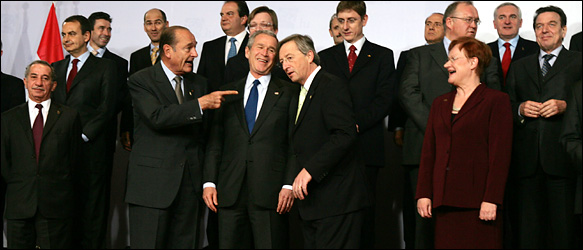Bush Says Europe Should Not Lift Its China Arms Embargo
 Stephen
Crowley/The New York Times
President Bush was flanked yesterday by President Jacques Chirac of
France, left, and Prime Minister Jean-Claude Junker of Luxembourg, president of
the European Union, at an official portrait session in Brussels. The woman at
right is President Tarja Halonen of
Finland. |
Published: February 23, 2005
BRUSSELS, Feb. 22 - A simmering dispute with Europe came to the forefront on Tuesday when President Bush said there was "deep concern" in the United States that lifting the European Union's arms embargo against China would change the balance of relations between China and Taiwan.
The issue has been one of the few disagreements to spill into the open during Mr. Bush's trip to repair relations across the Atlantic. He and European leaders have worked intently to ease hard feelings over the Iraq invasion, and they have played down the conflict that has risen in the last few months over the arms embargo. Even as he expressed his concerns on Tuesday, Mr. Bush insisted that he was willing to listen to European views on the issue.
In his most explicit public argument, the president said lifting the ban would allow the transfer of critical military technology to the Chinese that would "change the balance of relations between China and Taiwan, and that's of concern."
The administration also fears that such technology, especially advanced radar and communications systems, might be passed on to other countries.
Mr. Bush spoke at a joint news conference with the secretary general of NATO, Jaap de Hoop Scheffer, after a summit meeting of alliance leaders agreed to help train security officers for Iraq.
For Europe, the end of the embargo, which was imposed in 1989 after China's crackdown on pro-democracy protesters in Tiananmen Square, would open a profitable new avenue for arms sales. But leaders also say allowing the sales, which they propose to do by June, would be an important way to forge ties with China.
President Jacques Chirac of France said Tuesday that Europe remained steadfast in its desire to end the ban. He said that "we intend to lift the last obstacles in our relations" with China. But he also said the ban should be lifted "under conditions that Europe and the United States define together."
Officials on both sides said that underneath the diplomatic words was a deep philosophical divide, and that the Americans were taking a hard line against European willingness to engage the Chinese in negotiations and promises.
The European Union is almost certain to lift the 15-year-long embargo by June, but it has tried to quell American fears by saying it will limit the transfer of advanced technology to the Chinese by developing a tough new "code of conduct" for arms exports.
Mr. Bush said he was interested in looking at that code of conduct, and went so far as to say on his second day of a four-day trip to Belgium, Germany and Slovakia that he was on a "listening tour." But he expressed skepticism about the ability of the Europeans to come up with a proposal for curbing the transfer of technology to the Chinese that would satisfy the United States.
"Whether they can or not, we'll see," he said.A senior Bush administration official who briefed reporters on Monday night was far more unequivocal about the administration's opposition. "We remain concerned," the official said. "I should not leave you in any way with the impression that we have changed our view. We have merely heard out the Europeans. I expect that a dialogue - a friendly, serious dialogue about these issues - will continue."
Bush administration officials are most concerned that lifting the embargo would allow the Europeans to sell such advanced technology to the Chinese that they will be able to move to a "next generation" warfare capacity and develop the kind of sophisticated military systems that the United States has used in Afghanistan and Iraq. Such systems could include advanced airborne radar and communications systems, possibly similar to the American E-8C Joint Stars aircraft that help give commanders the ability to reroute troops and airstrikes quickly on the battlefield.
"The administration is not concerned at this time that the Europeans are going to start selling fighter jets, missiles and tanks to the Chinese," said Robin Niblett, the director of the European program at the Center for Strategic and International Studies in Washington.
In his news conference, Mr. Bush also told the Europeans that when they settled on their new code of conduct, they needed to "sell it to the United States Congress."
(以下省略)